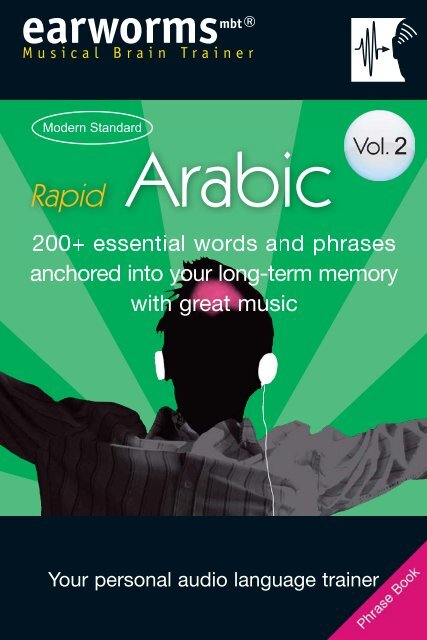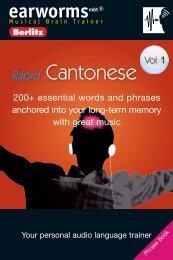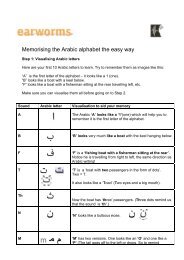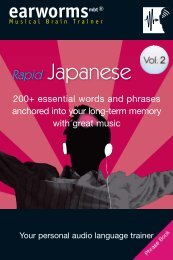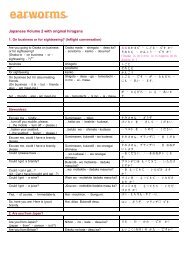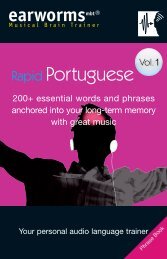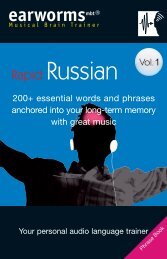Your Personal audio language Trainer - Earworms
Your Personal audio language Trainer - Earworms
Your Personal audio language Trainer - Earworms
Create successful ePaper yourself
Turn your PDF publications into a flip-book with our unique Google optimized e-Paper software.
earwormsmbt ®<br />
Musical Brain <strong>Trainer</strong><br />
Modern Standard<br />
Rapid Arabic<br />
200+ essential words and phrases<br />
anchored into your long-term memory<br />
with great music<br />
<strong>Your</strong> personal <strong>audio</strong> <strong>language</strong> trainer
<strong>Your</strong> personal <strong>audio</strong> <strong>language</strong> trainer
earworms mbt® Rapid Arabic puts the words and<br />
phrases you need not just on the tip of your tongue, but<br />
also transports them deep into your long-term memory.<br />
Simply by listening to these specially composed melodies<br />
with their rhythmic repetitions of Arabic and English a few<br />
times, the sound patterns are indelibly burned into your<br />
auditory cortex. You will have successfully learned the<br />
Arabic phrase and have the correct accent ringing in your<br />
ears. Wherever you are, whatever you are doing: while<br />
jogging, in the car, in the bath, doing the ironing…<br />
you can be learning Arabic at the same time!<br />
earworms mbt® Rapid Languages is the first <strong>language</strong><br />
course to get your toe tapping.<br />
You know the phenomena of those catchy tunes or<br />
earworms that you just can’t get out of your head? Voulezvous<br />
coucher avec moi, ce soir? Well, earworms mbt® has<br />
put this phenomena to positive use. Gone are the days of<br />
learning pressure and frustration at not being able to<br />
remember – the experience of many on conventional<br />
<strong>language</strong> courses. In combination with music, the phrases<br />
you need are automatically anchored deep into your<br />
memory, ready for instant recall.<br />
Music is the key<br />
The idea is as simple as it is old. Before the age of writing,<br />
ancient historical events were recorded in verse and song<br />
form for easy memorisation. In his book ‘Songlines’<br />
Bruce Chatwin describes how the Australian Aborigines<br />
were able to navigate their way across hundreds of miles of<br />
desert to their ancestral hunting grounds without maps.<br />
And how? The extensive lyrics of their traditional songs<br />
were exact descriptions of the routes!
Rhythm and words (i.e. song and verse) have always been<br />
a very powerful memory aid, and this is supported by<br />
recent scientific research. The advertising industry knows<br />
only too well how powerful music can be in getting<br />
the message across with brainwashing-like jingles and<br />
soundbites.<br />
It really works!<br />
Developed and used over years in the classroom,<br />
earworms mbt® Rapid Languages has shown<br />
phenomenal success. In tests pupils using this technique<br />
regularly get average marks of over 90% compared to less<br />
than 50% with conventional book-based learning.<br />
Why hasn’t music been used more in education up to<br />
now? Imagine kids at school getting a CD of hip hop<br />
songs with all the historical dates they have to learn, or all<br />
the irregular verbs they have to learn! Wouldn’t that make<br />
their (and teachers’) school lives much easier, much<br />
more fun, much more successful?<br />
What you get<br />
Volume 1 dealt with the essentials for your visit<br />
abroad and was very much ‘I-centric’, e.g. I’d like …,<br />
Can I have …?, Can you tell me …?, I need …,<br />
I’ve reserved …, I’ve lost …, and so on.<br />
Volume 2 has more to do with conversation:<br />
Are you travelling to … on business?, Are you from …?,<br />
I’ll take you to … , What do you do?, etc.<br />
Among other themes you are also introduced to future<br />
and past tenses. The themes follow closely the Common<br />
European Framework for <strong>language</strong> learning, a recognised<br />
benchmark of <strong>language</strong> proficiency, and the emphasis<br />
is constantly on usefulness to the learner.
Modern Standard Arabic<br />
Modern Standard Arabic is the official written <strong>language</strong> of<br />
the Arabic speaking world. It also doubles up as a<br />
universal spoken <strong>language</strong> to enable peoples of different<br />
Arab nations and regional dialects to easily communicate.<br />
As the official written form, it usually follows strict rules of<br />
grammar with special case endings (as in Latin), but as a<br />
spoken <strong>language</strong> these endings can be, and often are, left<br />
out, which is good news for the initial learner.<br />
The earworms approach has been to record the <strong>language</strong><br />
as it might be spoken in the simplest possible, most useful<br />
way. The phonetic text we have included, follows, (as far<br />
as is possible), the original Arabic intonation heard in the<br />
recordings.<br />
The original Arabic text together with an interesting method<br />
for learning to read Arabic has been treated<br />
separately and is available on the earworms website.<br />
Check it out at:<br />
www.earwormslearning.com > extras > Arabic.<br />
Lastly – a word of thanks<br />
The earworms team would like to thank you for putting<br />
your trust in our ‘slightly different’ learning concept<br />
and are sure that you will have the success that many<br />
others have already had. It’s motivating to know that<br />
learners are really benefiting from our research and<br />
development. Also, as accelerated learning is a rapidly<br />
growing field, we look forward to hearing about your<br />
experiences and successes – so feel free to visit us<br />
on the website:<br />
www.earwormslearning.com
1. On business or on vacation? (Inflight conversation)<br />
Are you travelling ~ to Cairo ...<br />
Are you travelling ...<br />
... on business ...<br />
(lit.: ... for the work ...)<br />
... or ~ on vacation?<br />
(lit.: ... or ~ for the vacation?)<br />
I’m ~ here ~ on business ...<br />
... and ~ also ~ for visiting ~ friends.<br />
and ~ also<br />
for visiting<br />
friends<br />
(lit.: the friends)<br />
Could you switch off your mobile?<br />
(lit.: Possible to switch off the mobile?)<br />
to switch off ~ the mobile<br />
Yes, sure.<br />
Excuse me, ~ I’d like ~ an apple juice.<br />
Yes, at once.<br />
Here you are, your juice.<br />
juice<br />
your juice<br />
Thank you ~ very much.<br />
Tusefir ~ illa al Ka-hera ...<br />
Tusefir ... (to a man) / Tusefiri ... (to a woman)<br />
... li al ammal = li’l ammal ...<br />
... aw ~ li’l si-eha?<br />
Ana ~ huna ~ li’l ammal ...<br />
... wa ~ aydan ~ li zee-arat ~ al asdeq’a.<br />
wa ~ aydan<br />
li zee-arat<br />
al asdeq’a<br />
Mumkin an takfel al mobile?<br />
an takfel ~ al mobile<br />
Na-am, akid.<br />
Aafwan ~ urid(u)* ~ asir tufeh’.<br />
Na-am, fawran.<br />
Taffaddal, asir-ukum.<br />
asir<br />
asir-uka (to a man)<br />
asir-uki (to a woman)<br />
asir-ukum (formal or to a group)<br />
Shukran ~ jazeeran.<br />
* ‘Uridu’ is the more formal version of ‘urid’.<br />
mbt ®<br />
earworms<br />
Musical Brain <strong>Trainer</strong><br />
Read the Arabic phonetics to give yourself<br />
extra visual input.<br />
To perfect your pronunciation, let your ears<br />
guide you!
2. Are you from Egypt?<br />
Are you from Egypt?<br />
Are you ...<br />
... from Syria?<br />
... from Palestine?<br />
Are you Palestinian?<br />
English<br />
Are you from England?<br />
No, ~ I’m not ~ from England.<br />
And from where are you?<br />
I am from Egypt ~ but I live ~ in England.<br />
... in London.<br />
Are you ~ from Cairo?<br />
No, I am ~ not ~ from Cairo.<br />
I am not ~ from Port Sa-id.<br />
And from where ~ are you?<br />
I am from Alexandria.<br />
Are you ~ the first ~ time ~ in Cairo?<br />
Yes, first time.<br />
I wish you a nice stay in Cairo.<br />
(lit.: Wish on you ~ stay nice ~ in Cairo.)<br />
Wish on you ...<br />
... a nice stay.<br />
(Hal*) anti ~ min Misr?<br />
Hal anta ... (to a man) / Hal anti ... (to a woman)<br />
... min Sooria?<br />
... min Filastin?<br />
Hal anta Filistini (to a man)?<br />
Hal anti Filistinaya (to a woman)?<br />
Ingilizi (male) / Ingilizaya (female)<br />
Hal anta / anti min Ingilterra?<br />
La-a, ~ ana lastu ~ min Ingilterra.<br />
Wê min ayna anti?<br />
Ana min Misr ~ wêlekin, a-isha ~ fi Ingilterra.<br />
... fi Lon-don.<br />
Hal anti ~ min al Ka-hera?<br />
La-a, ana ~ lastu ~ min al Ka-hera.<br />
Ana lastu ~ min Bor Sa-id.<br />
Wê min ayna ~ anta / anti?<br />
Ana min al Askindaraya.<br />
Hal anta ~ aw el mar-ra ~ fi al Ka-hera?<br />
Na-am, aw’l mar-ra.<br />
A-themenna leykum ~ erkama sayidah<br />
~ fi el Ka-hera.<br />
A-themenna leykum ...<br />
... erkama sayidah.<br />
* ‘Hal’ just signifies that it is a question and can be left out.
3. I’m glad to see you!<br />
Hi Layla. I’m glad ~ to see you.<br />
I’m pleased ... / I’m glad ...<br />
We are glad ...<br />
Marhaba Layla. Ferah’tu ~ li royetik.<br />
Ferah’tu ...<br />
Ferah’nu ...<br />
... to see you.<br />
(lit.: ... for ~ seeing yours.)<br />
Hello Mohammed. I’m glad to see you.<br />
... li ~ royetak / royetik / royetikum*.<br />
Marhaba Mahammad. Ferah’tu li royetak*.<br />
I’m ~ (the) Mrs. ~ Layla Shuckri.<br />
I’m ~ (the) Mr. ~ Peter Jones.<br />
Hello and welcome, I am honoured.<br />
... we are honoured.<br />
I’m honoured ~ to meet you.<br />
to meet you<br />
(lit.: with the meeting yours)<br />
How ~ was ~ your journey?<br />
(lit.: How ~ was ~ journey of yours?)<br />
journey<br />
your journey<br />
was<br />
(It) was good. (It) was fine.<br />
When ~ did you leave ~ London?<br />
I left London ~ at 4.<br />
We left London ~ at 3.<br />
Ana ~ as-Sayyida** ~ Layla Shuckri.<br />
Ana ~ as-Sayyid** ~ Peter Jones.<br />
Ahlan wa sahlan, tasharaf-tu.<br />
... tasharaf-na.<br />
Tasharaf-tu ~ bi’l ka-ik*.<br />
bi’l ka-ak / ... ka-ik / ... ka-ukum*.<br />
Kaifa ~ kernet ~ rehletak?<br />
rehle<br />
rehletak / rehletik / rehletikum*<br />
kêrnet<br />
Kêrnet jayida. Kêrnet mumteza.<br />
Meta ~ tarakta / tarekti ~London?<br />
Taraktu London ~ as-sâ-a ar-rabia.<br />
Tarakna London ~ as-sâ-a ath-thelitha.<br />
* ... ak/ik/kum: These endings are used respectively when addressing a man,<br />
a woman or a group of people; ‘kum’ is also used when addressing a person<br />
formally.<br />
** al Sayyida and al Sayyid mutate to as-Sayyida and as-Sayyid. This makes<br />
pronunciation easier.<br />
mbt ®<br />
earworms<br />
Musical Brain <strong>Trainer</strong>
4. Future plans<br />
What ~ will ~ we do ~ later?<br />
will ~ we do<br />
later<br />
we do / we will do<br />
Firstly ~ we will go ~ to the hotel.<br />
Firstly ...<br />
... we will go ...<br />
(lit.: … will ~ we go)<br />
... I will go ...<br />
(lit.: ... will ~ I go)<br />
And later ...<br />
... we will go ~ to the restaurant.<br />
And what ~ will we ~ eat?<br />
And what ~ will you eat?<br />
We will eat ~ an Arabian meal.<br />
I will eat ~ couscous.<br />
Will you eat couscous?<br />
I love couscous.<br />
I will try ~ the fish. / ... the soup.<br />
We’ll try ~ the soup.<br />
(It) will ~ be ~ good.<br />
I will eat / we will eat<br />
I will go / we will go<br />
I will travel / we will travel<br />
I will try / we will try<br />
Med-tha ~ sa ~ na-fa’alu ~ la hekan?<br />
sa ~ na-fa’alu<br />
la hekan<br />
na-fa’alu / sa na-fa’alu<br />
Awulan ~ sa n’adth-habu ~ illa al funduq.<br />
Awulan ...<br />
... sa ~ n’adth-habu ...<br />
... sa ~ adth-hab ...<br />
Wa la hekan ...<br />
... sa ~ n’adth-habu ~ illa al mat’am.<br />
Wa med-tha ~ se ne ~ erkul?<br />
Wa med-tha ~ se te erkul?<br />
Se n’erkul ~ wajbah Arrabia.<br />
Se erkul ~ couscous.<br />
Se te erkul couscous?<br />
Uhibb(u) couscous.<br />
Sa aduwq ~ as-samak. / ... a’shurba.<br />
Sa n’aduwq ~ a’shurba.<br />
Sa ~ akoon ~ jayid.<br />
se erkul / se n’erkul<br />
sa adth-hab / sa n’adth-habu<br />
sa usefir / sa n’usefir<br />
sa aduwq / sa n’aduwq<br />
* ‘Will’ can sound like ‘sa’ or ‘se’.
5. I have reserved ... (Checking in)<br />
Hello!<br />
(lit.: Welcome!)<br />
Can I be ~ of help?<br />
I have reserved ~ a room ~ with you.<br />
(lit.: Already reserved I ~ room ~ with you.)<br />
Already ...<br />
... I reserved ...<br />
... in the name of Jones.<br />
Welcome to Cairo, Mr. Jones.<br />
Ah yes, Mr. Jones, a room with two beds.<br />
<strong>Your</strong> passport, please.<br />
(lit.: The passport, please.)<br />
Here you are.<br />
How would you like to pay?<br />
(lit.: How ~ would you like ~ the bill?)<br />
Cash ~ or ~ by card?<br />
By card, please.<br />
Here you are, the key to the room.<br />
key (also means ‘spanner’)<br />
keys<br />
The number of the room ~ is 25.<br />
(five and twenty)<br />
Excuse me, where is the dining room?<br />
The dining room ~ is there.<br />
Do you need ~ help with your baggage?<br />
Do you need ...?<br />
(lit.: You need ...?)<br />
No, thank you.<br />
Marhaba!<br />
Hal ~ min musa’adah?<br />
L’qad’ hajastu ~ ghorfa ~ aindukum.<br />
L’qad’ ...<br />
... hajastu ...<br />
... bi ismi Jones.<br />
Marhaba bi’l Ka-hera, Sayyid Jones.<br />
Ah na-am, Sayyid Jones, ghorfa bi sarirayn*.<br />
Al jawas suffer, min fadlik / fadlak.<br />
Taffa-dal (to a man). / Taffa-dali (to a<br />
woman).<br />
Kaifa ~ turidu ~ al hiseb?<br />
Def’an ~ aw ~ bil carrt?<br />
Bil carrt, min fadlik / fadlak.<br />
Tafad-dal, mufte’h al ghorfa.<br />
mufte’h<br />
mfatia’h<br />
Rakumet al ghorfa ~ hamsa wa ashroon.<br />
Lau samaht, ayna ghorfat al akyl?<br />
Ghorfat al akyl ~ hoonegg.<br />
Tah’tej ~ musa’adah bi hakibetak?<br />
Tah’tej ...? (to a m.) / Tah’teji ...? (to a w.)<br />
Laa, shukrran.<br />
* sarir = bed / sarirayn = two beds<br />
mbt ®<br />
earworms<br />
Musical Brain <strong>Trainer</strong>
6. More numbers<br />
11 (remember 10 = a’ashara))<br />
12<br />
13<br />
14<br />
15<br />
16<br />
17<br />
18<br />
19<br />
20<br />
21 (one and twenty)<br />
22 (two and twenty)<br />
23 (three and twenty)<br />
24<br />
25<br />
26<br />
27<br />
28<br />
29<br />
30<br />
35 (five and thirty)<br />
40<br />
50<br />
60<br />
70<br />
80<br />
90<br />
* Sometimes pronounced ‘aishreen’.<br />
eh’da a’asha<br />
ithna a’asha<br />
thalêthata a’asha<br />
arba’ata a’asha<br />
hhamsata a’asha<br />
sittata a’asha<br />
sabbata a’asha<br />
thamêniata a’asha<br />
tissata a’asha<br />
aishroon*<br />
wêhid wa aishroon<br />
ithnayn wa aishroon<br />
thalêtha wa aishroon<br />
arba-ah wa aishroon<br />
hhamsah wa aishroon<br />
sittah wa aishroon<br />
saba-ah wa aishroon<br />
thamêneya wa aishroon<br />
tisaah wa aishroon<br />
thalêtoon<br />
hhamsah wa thalêtoon<br />
arba’a-oon<br />
hams-oon<br />
sitt-oon<br />
sabbah-oon<br />
thamên-oon<br />
tissa-oon
100<br />
me’-a<br />
101<br />
me’-a wehid<br />
1000<br />
alf<br />
2000<br />
alfayn<br />
2011<br />
alfayn wa eh’da a’ashar<br />
2012<br />
alfayn wa ithna a’ashar<br />
2013<br />
alfayn wa thalêthata a’ashar<br />
2014<br />
alfayn wa arba’ata a’ashar<br />
Interestingly the ‘Arabian Nights’ stories are called ‘1001 Nights’ in Arabic.<br />
1001 nights = alf leyla wa leyla<br />
lit.: a thousand nights and a night<br />
night<br />
leyla<br />
Unleashing the brain’s potential<br />
Learning to music is not only relaxing and enjoyable, it is also highly effective.<br />
Recent research accounts for this in two main ways.<br />
Firstly, music primes the neural networks and puts the learner into the optimum<br />
state of consciousness for learning, the so-called Alpha state; relaxed but at the<br />
same time receptive.<br />
Also, music engages and stimulates both the right and left hemispheres of the<br />
brain, allowing ‘whole brain learning’ processes. Traditional teaching practice<br />
has tended to favour the left hemisphere of the brain which is more concerned<br />
with logic, mathematical thinking, reading and the rules of grammar –<br />
discounting the value of the senses and emotions in the learning process. By<br />
tapping into the auditory cortex, the area responsible for processing and storing<br />
sound waves, and to some extent evoking an emotional response through music<br />
and dialogue, earworms engages the right hemisphere, unleashing more<br />
learning potential.<br />
mbt ®<br />
earworms<br />
Musical Brain <strong>Trainer</strong>
How often do I have to listen to the earworms CD<br />
before I can really remember all the <strong>language</strong> on it?<br />
With the appeal of the earworms songs we<br />
hope that it is not a question of ‘having to’,<br />
it is rather a question of ‘wanting to’. But seriously:<br />
the memory is like a muscle, it needs to be trained<br />
and exercised. Based on scientific studies, the<br />
ideal is listening relatively intensively at the<br />
beginning – the ‘learning phase’ – thereafter<br />
listening periodically to review what you<br />
have learnt and refresh your memory.<br />
In practical terms this means listening to<br />
the whole album the first day in order to<br />
‘tune your ear in’ to the sounds of the<br />
<strong>language</strong>. Then listen regularly, several<br />
times, over a period of one or two weeks,<br />
making sure that you listen to every track<br />
equally as many times. While listening,<br />
actually speak the words out loud, when<br />
you can, to get a feeling for their pronunciation.<br />
After this, go through the booklet<br />
and test your knowledge, picking out any<br />
gaps that you may wish to concentrate on.<br />
Lastly, the review phase. As we all know,<br />
memories fade, so it is important to refresh<br />
your memory by listening to the CD at your<br />
leisure, say, once a week for the following few<br />
weeks. Thereafter, monthly.<br />
This review phase is crucial as it consolidates<br />
your knowledge and transfers it into your<br />
long-term memory. Although this demands<br />
self-discipline, it is of course without effort,<br />
as you are only listening to songs.<br />
The result is that you will be able to recall the<br />
words and phrases with the same ease that<br />
you remember your telephone number!
7. Telephone booking<br />
Good evening. This is Hotel Cairo.<br />
(lit.: Good evening. With you ~ Hotel Cairo.)<br />
(Reply:) Good evening. Have you a room<br />
for tonight?<br />
tonight<br />
(lit.: this night)<br />
For how many people?<br />
Masa al-hayr. Ma-aikum ~ Funduq’<br />
al Ka-hera.<br />
Masa an-nur. Hal aindakum ghorfa<br />
li hazihi al layla?<br />
hazihi al layla<br />
Li kem farrdan (or: shachs)?<br />
For one person only.<br />
(lit.: For person one only.)<br />
For two. / For two persons.<br />
With one bed for two people.<br />
For how many nights?<br />
(lit.: For how many evenings?)<br />
For one night.<br />
(lit.: For night one.)<br />
For two nights.<br />
(lit.: For nights two.)<br />
For three nights. / For four nights.<br />
For a week.<br />
With breakfast?<br />
Yes, the price of the room is with breakfast.<br />
I will come at 5 o’clock.<br />
(lit.: I will go 5 o’clock.)<br />
My name is Jones.<br />
Have you a mobile number?<br />
Yes, I have.<br />
0 0 1 ~ 3 7 9<br />
4 5 2 ~ 1 1 8<br />
Thank you Mr. Jones, goodbye.<br />
Li farrd wêhid faq’at. / Li shachs wêhid<br />
faq’at.<br />
Li ithnayn*. / Li farrdayn*. Li shachsayn*.<br />
Bi sarir wêhid li farrdayn*.<br />
Li kem layla?<br />
Li layla wêhida.<br />
Li laylatayn*.<br />
Li thalat layerli. / Li arba-a layerli.<br />
Li isboa.<br />
Bil iftar?<br />
Na-am, as saar al ghorfa bil iftar.<br />
Sa adth-hab asa-a hamsa.<br />
Ismi Jones.<br />
Hal aindukum rakum mobyle?<br />
Na-am, aindy.<br />
zifrr zifrr wêhid ~ thalêtha saba-ah tisaah<br />
arba-a hhamsah ithnayn ~ wêhid wêhid<br />
thamêneya<br />
Shukran Sayyid Jones, ma’a as-salema.<br />
* Things in ‘twos’ take the ending ‘ayn’.<br />
mbt ®<br />
earworms<br />
Musical Brain <strong>Trainer</strong>
8. <strong>Personal</strong> details<br />
first name<br />
(lit.: name of person, i.e. personal name)<br />
family name<br />
(lit.: name of family)<br />
<strong>Your</strong> first name?<br />
nationality<br />
your nationality<br />
What is your nationality?<br />
passport number<br />
(lit.: number ~ passport)<br />
profession<br />
married<br />
Are you married?<br />
single<br />
Are you single?<br />
What is your age?<br />
(lit.: How much your age?)<br />
place of birth<br />
date of birth<br />
ism al shachsi<br />
ism al aiyla<br />
Ismuku al shachsi? (to a man)<br />
al jinsaya<br />
jensiyittik / jensayittak<br />
Ma jensiyittik? / Ma jensayittak?<br />
rakkum ~ jawaz al suffer<br />
al mehina<br />
motazawig / motazawiga<br />
Hal anta motazawish? / Hal anti motazawisha?<br />
arsab<br />
Hal anta arsab? / Hal anti arsaba?<br />
Kem omrok? / Kem omrik?<br />
makem al miled<br />
terrirrh al miled<br />
The months of the year:<br />
yanayir, febrayir, meris, abreel, mahyoo, yunia, yulia, augoostoos,<br />
sibtemberr (role the ‘r’), octoberr, nofemberr, dicemberr<br />
Now guess these dates:<br />
1. saba-a febrayir<br />
2. thalatoon meris<br />
3. arba-a yulia<br />
4. thamêneya wa ashroon sibtemberr
9. At the restaurant<br />
Good evening. I have reserved a table<br />
for two in the name of Jones.<br />
Hallo and welcome!<br />
This way.<br />
(lit.: Here you are, here.)<br />
Here you are, the menu.<br />
And what would you like to drink?<br />
Just a moment, please.<br />
I will drink ~ orange juice, please.<br />
I prefer ~ a cup of ~ tea ~ with mint.<br />
Do you want sugar?<br />
Yes, with a bit ~ of sugar.<br />
And to eat?<br />
(lit.: And for the food?)<br />
Do you like ~ fish / lamb?<br />
Yes, I like fish / lamb.<br />
I shall take the fish.<br />
Will you take the fish?<br />
I take ... / you take ...<br />
Would you like ~ to take ~ rice or salad?<br />
Yes, bring ~ also salad and rice.<br />
Mmmm! The food is delicious, ~ very delicious!<br />
Would you like anything else?<br />
(lit.: Do you request ~ anything else?)<br />
No thank you, not ~ now.<br />
Masa el hayr. Hajustu tawila li ithnayn,<br />
bi ismi Jones.<br />
Ahlan wa sachlan!<br />
Tafâd-dallu*, huna.<br />
Tafâd-dal, kartet et ta-am.<br />
Wa medtha tuhibu an tashrub?<br />
Lahza, min fudluk.<br />
Sa ashrab ~ asir burtoqual, law samaht.<br />
Ufaddil ~ finjen ~ shay ~ bil narneha.<br />
Tuhhib sukkar?<br />
Na-am, bi kahlil ~ min al sukkar.<br />
Wa li’l erkul?<br />
Tuhibb ~ samak / lahma haruf?<br />
Naam, uhib samak / lahma haruf.<br />
Sa erhudth samak.<br />
Se terhudth samak?<br />
erhudth ... / terhudth ...<br />
Hal tuhibb ~ an terhudth ~ ruzz aw salata?<br />
Naam, ehhdir ~ aydan ~ salata wa ruzz.<br />
Mmmm! Al akl’ tayyib, ~ tayyib jiddan!<br />
Hal tu’mor ~ bi shay aahar?<br />
Shukran la’a, laysa ~ al enn.<br />
Yes, please, fruit. Have you ~ melon and dates? Na-am, law samaht, fawekih.<br />
Hal aindukum ~ shamem wa tamr?<br />
* Ending ‘dallu’ when addressing more than one person.<br />
mbt ®<br />
earworms<br />
Musical Brain <strong>Trainer</strong>
10. What do you do?<br />
What do you do?<br />
(lit.: What ~ you work?)<br />
I work ~ in a bank.<br />
Since when ~ do you work there?<br />
About 10 years.<br />
(lit.: About ~ 10 ~ years-time.)<br />
Really?<br />
(lit.: Right?)<br />
How old are you?<br />
(lit.: How much age yours?)<br />
30 years old.<br />
(lit.: 30 years.)<br />
I don’t believe that.<br />
Are you married? (asking a woman)<br />
No, I’m not married. (woman says)<br />
Is your family here in Cairo?<br />
family / your family / my family<br />
my mother / father / brother / sister<br />
my husband / my wife<br />
(lit.: my man / my woman)<br />
What ~ are you doing ~ tomorrow?<br />
(lit.: What ~ will you do ~ tomorrow?)<br />
Can we meet?<br />
(lit.: Is it possible ~ that we meet?)<br />
Yes, no problem.<br />
Where and when?<br />
Here, at 9 o’clock?<br />
Shall we go to the pyramids?<br />
Yes, good idea.<br />
(lit.: Yes, idea good.)<br />
Bye, until then.<br />
(lit.: Bye, until the meeting.)<br />
Med-tha ~ t’arm’al?<br />
Arm’al ~ fi bank.<br />
Mundu meta ~ t’arm’al hunegg?<br />
Hawely ~ ashr ~ sanna-wed.<br />
Hakan?<br />
Kem omrik? (to woman)<br />
Thelêtoon sanna.<br />
La-a ussadak hedtha.<br />
Hal anti mutazowisha?<br />
La-a, lastu mutazawisha.<br />
Hal aiylatik ~ huna fi al Ka-hera?<br />
aiyla / aiylatik(ak) / ah’-li<br />
omi / abbi / ahi / ochti<br />
zowshi / zowshati<br />
Med-tha ~ se t’afa-al ~ gaâ-dan?<br />
Hal mumkin ~ an noltoki?<br />
Na-am, lair mooshkilla.<br />
Ayna wa meta?<br />
Hunna, as-sâ-a at-têsia?<br />
Hal n’adth-habu illa al harum?<br />
Na-am, fikra jayida.<br />
Ma’a as-salema, iIla al laqah.
The science behind earworms mbt®<br />
1. How we learn<br />
A large part of learning in general and <strong>language</strong><br />
learning in particular is to do with the memorisation<br />
of words, facts and other significant information.<br />
It’s a well-known fact that we use only a fraction of<br />
our brain power and traditional book learning is now<br />
recognised as not suiting every learner.<br />
earworms uses simple techniques which open up<br />
and exploit more of the brain’s native power and<br />
come under the heading of ‘accelerated learning’.<br />
Researchers at Dartmouth College in the US<br />
reported that they had pinpointed the region of the<br />
brain where ‘earworms’ or catchy tunes reside,<br />
the ‘auditory cortex’. They found that the sounds<br />
and words that have actually been heard can be<br />
readily recalled from the auditory cortex, where the<br />
brain can listen to them ‘virtually’ again and again.<br />
2. What we learn<br />
earworms mbt adopts the so-called lexical<br />
approach to <strong>language</strong> learning. In essence, this<br />
means we look at <strong>language</strong> in terms of whole<br />
meaningful chunks, then break these down into their<br />
component bite-size, easily absorbable parts and<br />
then reconstruct them. You not only learn complete,<br />
immediately useful phrases, you also intuitively<br />
learn something about the structure (the grammar)<br />
of the <strong>language</strong>. These ‘chunks’ which the learner<br />
can ‘mix and match’, gradually build up to cover<br />
whole areas of the <strong>language</strong>.
Other <strong>language</strong>s available:<br />
Details at www.earwormslearning.com
mbt ®<br />
earworms<br />
Musical Brain <strong>Trainer</strong><br />
The Tracks:<br />
1. On business or on vacation?<br />
2. Are you from Egypt?<br />
3. I’m glad to see you!<br />
4. Future plans<br />
5. I have reserved ...<br />
6. More numbers<br />
7. Telephone booking<br />
8. <strong>Personal</strong> details<br />
9. At the restaurant<br />
10. What do you do?<br />
Concept & Text: Marlon Lodge, Project Development: Andrew Lodge, Project Management:<br />
Maria Lodge, Editorial Supervision: Renate Elbers-Lodge, Music: earworms, Arabic Voice: Riem Elfar,<br />
Graphic Design: Jaroslaw Suchorski @ HKP, Special thanks to: Jan, Evie, Anna, Freddy & Angela.<br />
www.earwormslearning.com<br />
© 2010 <strong>Earworms</strong> Ltd.<br />
ISBN 9781905443468<br />
Catalogue no. EWB AR2-468


